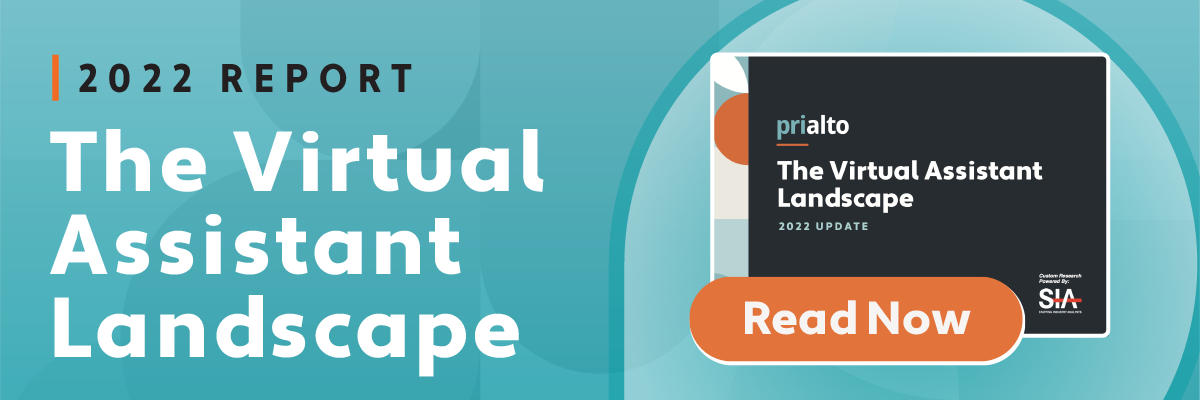Prialto has partnered with Staffing Industry Analysts (SIA) to publish a landscape report on the emerging virtual assistant industry that is available as of today.
When I started Prialto over 10 years ago, I joined a group of founders all starting virtual assistant companies who shared one thing in common: We all had the same advantage (or disadvantage!) of naivete characteristic of new entrants into an established industry. In fact, I don’t think any of us really realized we were entering the staffing ecosystem. This left us both unencumbered and uninformed by staffing-veteran assumptions.
I was simply inspired by my own wife’s work building a shared service in the Philippines for a large semi-conductor company in San Jose. I had also lived, worked and traveled throughout Asia first as a student crashing in youth hostels and traveling by bus, train and bicycle and, later, as a post-MBA professional with a generous expense account.
I brought this two-pronged lens to every customer service call I experienced: I saw that on the one hand, the people who sought to support me on those calls were too bright for a life of simply getting yelled at all day by frustrated computer and banking customers. And on the other hand, I knew of countless North American professionals who were overwhelmed by how technology had created unrealistic expectations for ever increasing productivity and 24hr engagement.
All this made me see a meaningful opportunity to foster connections via the growing number of internet powered collaboration tools between the global abundance of talented, hardworking individuals with limited career choices with U.S. professionals in need of administrative support.
In 2010, gig marketplaces were getting started, and most focused on traditional freelance roles like graphic design and website development. Early models generated a race to the bottom, with offshore freelances bidding on jobs for extremely low prices. Problems of quality control, accountability, and scalability were quickly apparent. My belief was that these marketplaces did little more than connect two people, which in a hyper connected world, seemed to add little value.
Meanwhile, my wife’s service center and the people in it had become invaluable for her company because she had also created systems and processes for context and a management culture to give employees a sense of place and growth. I looked to build something similar that would be shared not inside a single company, but by the growing ranks of solopreneurs, small businesses and, later by large corporations that would benefit from admin support if they did not have to manage it themselves and if it was built for the internet from the beginning.
Over the last decade, I’ve seen marketplaces find a significant place in the staffing ecosystem. But I’ve also seen their limitations and how they have underperformed investors’ expectations. Dozens of virtual assistant firms came and went because they thought they only needed to connect people without any meaningful structure. Meanwhile, only a few of us like Prialto, Red Butler (now Delegated) and Belay Services, have created lasting businesses that scale and deliver the quality of service that U.S. professionals and companies demand.
Our companies are built on robust management infrastructure on both sides of the relationship. Assistants are trained, onboarded, coached, and see advancement opportunities. This readies them for work on day one of being remotely staffed into demanding work environments in New York or San Francisco. We have created values-driven business cultures with meaningful employee benefits and support that are consistent with the values of the firms that hire us. At Prialto, we have also layered on enterprise grade security training and infrastructure.
Over time, we at Prialto have refined our model, and the company has steadily grown. Enter Covid-19 during which virtual commuting or telecommuting has become a norm. As demand for and acceptance of virtual assistants accelerated, we thought it an opportune time to pull back the lens and assess the landscape for virtual assistants. We turned to SIA to see where we stand among the various megatrends unfolding before, during, and after the pandemic—digital transformation, remote everything, and a widening skills gap.
You’ll see in the pages that virtual assistant services are established in the workforce solutions industry. The report validates what we have seen as the use of virtual assistants has spread from SMB to midmarket and is now into larger enterprises. The common theme among all is the need to focus on managing the people core to their business, the fact that managing admin employees is a distraction for most firms from this focus even while their support remains critical.
These are exciting times for Prialto. Amidst the uncertainty in the pandemic environment, new levels of demand for our services have enabled us to provide unprecedented levels of certainty and support to our staff in the U.S., SE Asia and Central America.
For us and our staff, the growth and innovation has amplified our business flywheel of continuous improvement. I’m sure that our strongest competitors are experiencing something similar. I’m looking forward to SIA’s audience and others gaining insights from this comprehensive view of where we fit into your broad staffing choices.

